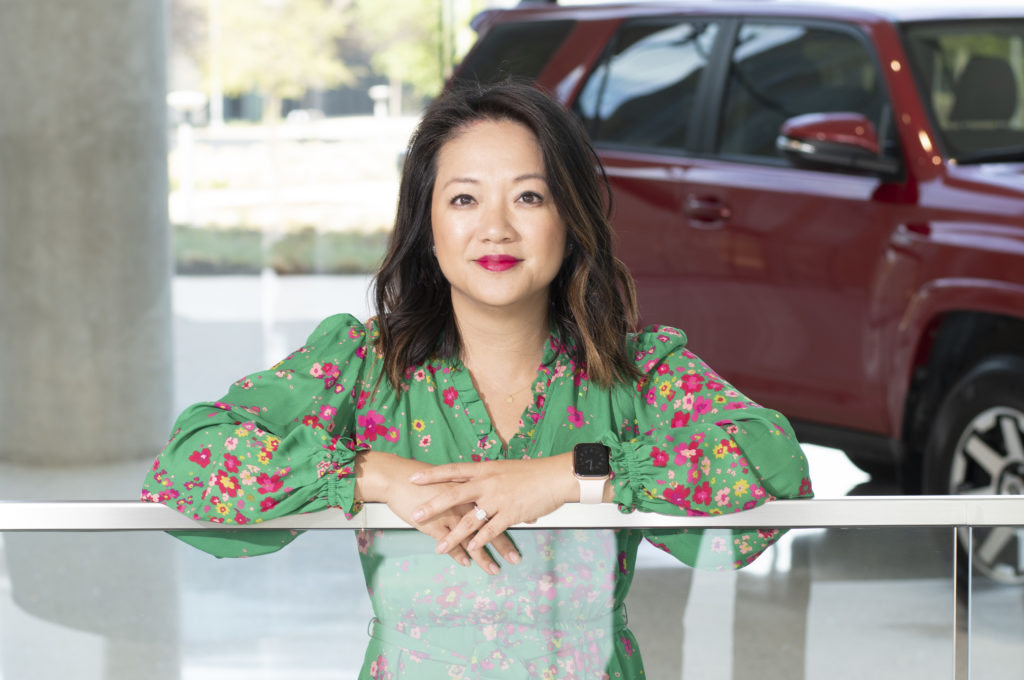
Meyling Ly was still weeks away from being born in 1980 when her Cambodian-born parents fled in the middle of the night for a refugee camp in Thailand. Their homeland, still in the hands of the notorious Pol Pot and his Khmer Rouge, offered no hope at the end of the notorious “killing fields.”
It was time to find another home.
The Lys took a dangerous boat journey up the Mekong River toward Chau Doc, followed by a 300-mile journey by foot and water buffalo cart to a refugee camp in Thailand. Finally, a 7,800 mile, 18-hour flight to Oakland – all while Ly’s mom was eight-months pregnant.
“I want the whole world to know my parents,” she said. “They are my heroes. They are why I am who I am.”
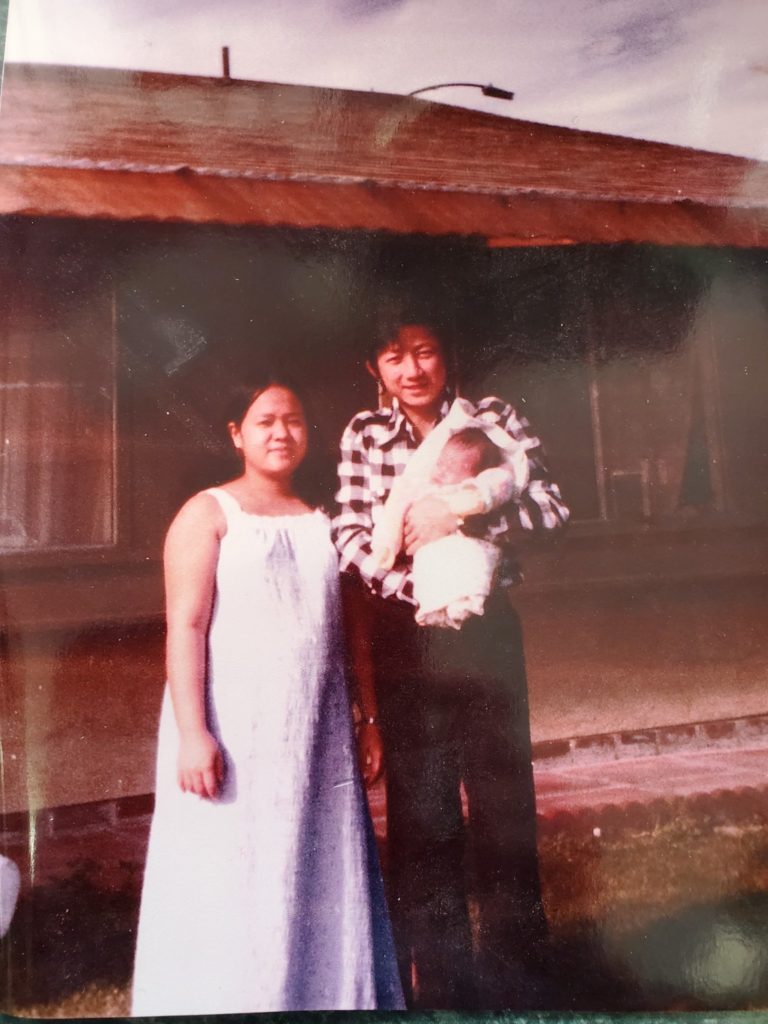
Meyling Ly and her parents
Now married and managing counsel for labor and employment law at Toyota Motor North America, Meyling Ly Ortiz is a phenomenon.
From successfully resolving a major wage and hour class action litigation in California to developing an innovative Bystander to Upstander training program that shows employees how to interrupt bias and microaggressions respectfully in the workplace so that harassment does not ever occur, Ly Ortiz is widely recognized as one of the creative minds and voices in corporate employment law in the U.S.
A 2006 graduate of the Southern Methodist University Dedman School of Law, Ly Ortiz has also gained the reputation as a lawyer-servant for her commitment to pro bono and public service. Last year, she served as co-chair of the Dallas Bar Association’s Equal Access to Justice Campaign and vice president of mentoring for the Dallas Women Lawyers Association. She is on the board of the nonprofit Terry Foundation and is a past president of the Dallas Young Lawyers Association.
In addition, Ly Ortiz personally mentors at least four law students each year, and she is actively involved in coaching national championship moot court programs.
Last year, she co-led a major initiative by Toyota’s legal department called the Active Bystandership for Law Enforcement Project, or ABLE, with Georgetown Law Center. The purpose of ABLE is to prepare officers to successfully intervene to prevent harm and to create a law enforcement culture that supports peer intervention.
“Mey joined our pro bono committee in 2019 like a ball of fire – full of passion to serve others and always raising her hand to take on a challenging task,” Toyota managing counsel Scott Young, who leads the automaker’s pro bono efforts, told The Texas Lawbook.
“Following the killing of George Floyd last May, our committee set about to find meaningful ways to make a difference,” Young said. “Mey enthusiastically helped us ‘pound the pavement’ to make dozens of phone calls and send even more emails to nonprofits, legal departments at other corporations, law firms and bar associations to identify appropriate opportunities.”
“Mey views pro bono not through the lens of an attorney providing legal services but from the perspective of those she is serving,” he said.
Citing her extraordinary commitment to helping others and giving back to the community, the Association of Corporate Counsel’s Dallas-Fort Worth Chapter and The Texas Lawbook have named Ly Ortiz as a finalist for the 2020 DFW Outstanding Corporate Counsel Award for Pro Bono and Public Service.
The finalists will be honored and the winner announced June 3 at the 2020 DFW Outstanding Corporate Counsel Awards ceremony at the George W. Bush Center.
Ben E. Keith assistant general counsel Punam Kaji and Carter Arnett partner Stacey Cho Hernandez, who nominated Ly Ortiz for the award, said she has a “longstanding record of giving back to the community, even as a young lawyer.”
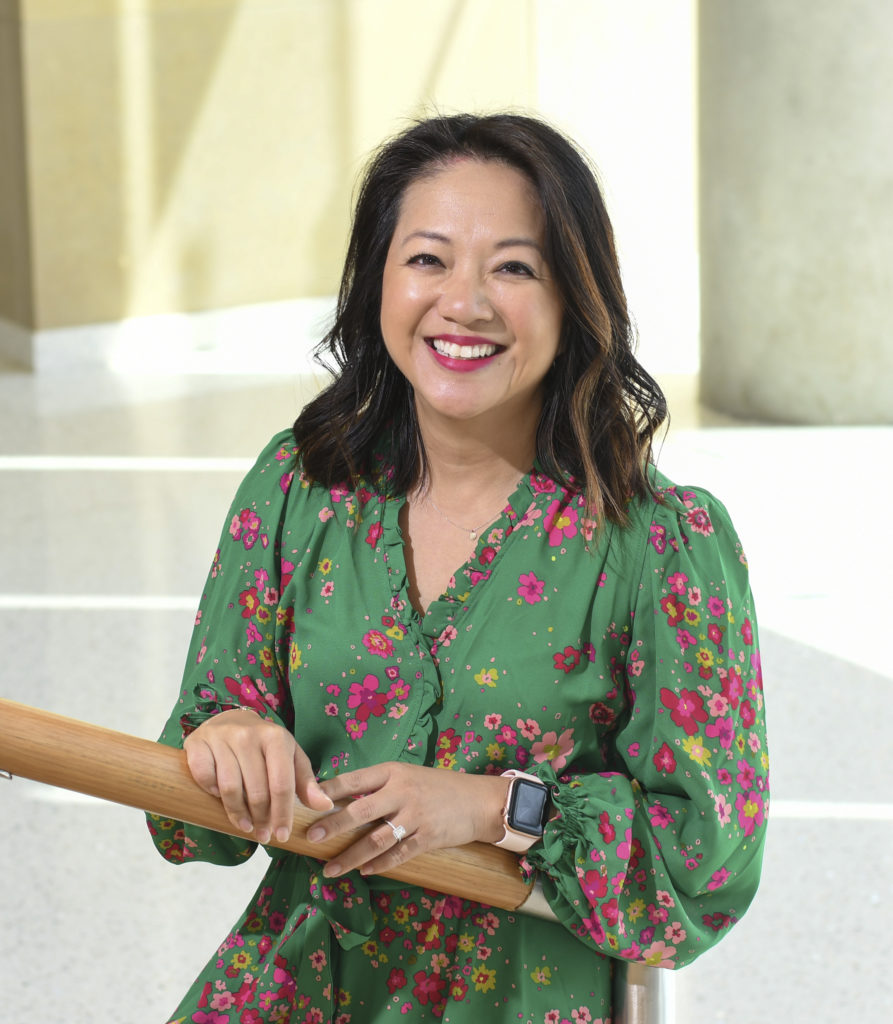
“She did not wait to give back after establishing herself or learning what being a lawyer meant – she began right away, volunteering to coach moot court at SMU in 2006 and she has been volunteering in this specific capacity for the past 14 years, devoting her time to coaching law students on their advocacy skills,” Hernandez and Kaji wrote. “Historically, Mey’s moot court teams at SMU almost always swept regionals and have won national awards in 2008, 2015 and 2016. This is a testament to Mey’s commitment to investing in others.”
Ly Ortiz told The Texas Lawbook that her heart for giving “stems from being first generation” American.
“Having immigrant parents and knowing from an early age that we did not get where we are alone,” she said. “It took a complex network of government assistance, nonprofit support, community efforts – it took the generosity of family, friends and strangers to get us where we are.”
Premium Subscribers: Click Here for a Q&A with Meyling Ly Ortiz
That “worldview and awareness,” she said, was enhanced when the Houston-based Terry Foundation – founded by Texas business leaders Howard and Nancy Terry – provided Ly Ortiz with a full scholarship to Texas A&M.
“These two strangers invested their success in students like me, giving us our college education with only one ask: to give back,” she said. “While I said yes at age 18, it’s a commitment that acts as a North Star today.”
Jessica Brown Wilson, a partner at FisherBroyles, said that Ly Ortiz is “the most thoughtful and generous person I know.”
“Mey has the heart but also the integrity and follow-through to make things happen,” Wilson said. “She led a young woman lawyer mentorship program in the midst of the Covid pandemic and championed the success of the program despite all odds. She worked hard to make sure every young lawyer seeking mentorship got what they needed out of the program.”
“She obviously has the smarts, but more importantly she has the EQ that is most important,” Wilson said. “She understands people. She strives to really get her clients’ goals and struggles and partners with them.”
Stephanie L. Sweitzer, an employment law partner at Morgan Lewis, said Ly Ortiz recognizes that “her legal recommendations impact people, not just numbers in a database or on a spreadsheet.”
“Mey is thoughtful and intentional in everything she does, down to small things like the note in her email signature block stating she works flexibly and sometimes sends emails outside of standard business hours, but recipients should not feel compelled to review, acknowledge or respond outside the times that suit them,” Sweitzer said. “Her acknowledgment that we all are juggling a lot – especially over the last year – and may send emails at odd hours but do not always need or expect a response right away, sets a positive tone.”
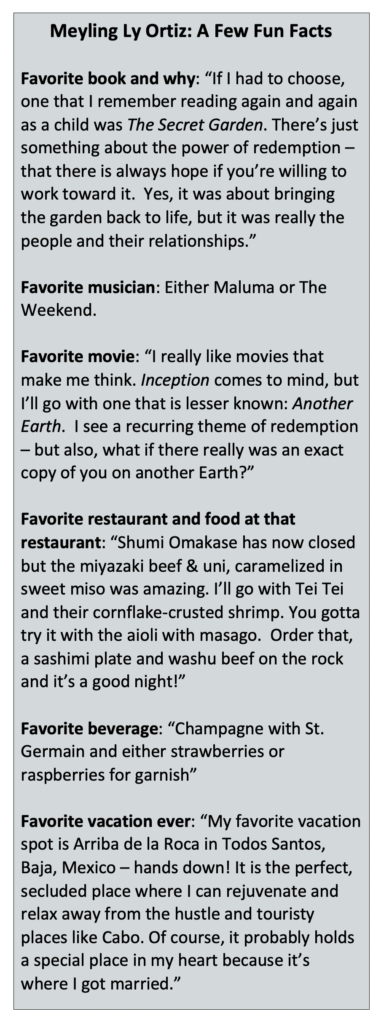
Meyling Ly Ortiz was born in San Jose, California, only a few weeks after her 21-year-old mother arrived in the U.S., which almost didn’t happen.
The Lys, both born in Cambodia, fled their native country in 1975. Ly Ortiz’s mother escaped to Vietnam thanks to forged papers engineered by her father. Ly Ortiz’s father joined her days later. But the region remained in turmoil, as the Khmer Rouge and Vietnam were also at war.
“The whole goal was to get to America,” Ly Ortiz said.
Her parents traveled overnight by boat from Saigon/Ho Chi Minh City up the Mekong River to Chau Doc, Thailand. For weeks, the couple traveled by foot and took a water buffalo cart for an estimated 310 miles to safety in Thailand.
“They were robbed by Khmer Rouge deserters, but luckily they didn’t get to the gold my dad hid in the sole of his sandal,” she said. “Luckily, they were let go and snuck across the border into Khao-I-Dang refugee camp, while everyone else was celebrating the [Thai/Cambodian] new year.”
The Lys spent several months at the refugee camp where they were interviewed by Red Cross officials and then flown from Bangkok to Oakland in early December 1980.
“My mother was eight-months pregnant and they would have never let her on the airplane, so she told them she was only five months pregnant,” Ly Ortiz said. “There’s also a story that my mom paid someone at the airport a $50 bribe to let her on the plane.”
Her father, who was 26 and studying to be a doctor in Cambodia, was waiting for his wife in the U.S.
“They had an arranged marriage and escaped to Thailand together,” she said. “My mom gave my dad an ‘out’ when they got to America because they were arranged, but dad didn’t want to leave me. They are still married today.”
The Ly family moved to Kaufman, Texas, a town just east of Dallas with about 5,000 people when she was growing up.
“We were the only Asian family in the entire town at that time,” she said. “As immigrants, my parents have done a lot to get where they are: migrant farming, working a manufacturing line, sewing factory, mechanic.
“Since I was in fifth grade, they have owned and operated a ‘mom and pop’ gas station,” she said. “It’s just the two of them. My parents own the store, do the bookkeeping and inventory, cook food to sell, stock and dust the shelves, clean the bathrooms. By the way, that meant we kids grew up doing the same.”
Ly Ortiz said her parents spoke Cambodian to each other but taught their children to speak Chinese and English.
“Mom would have cursory conversations with customers who would come into the store,” she said. “After they left, I asked her if she understood what they were telling her. She said, no, not a word.”
There were 181 students in Ly Ortiz’s high school graduating class, and she was the only one of Asian descent.
“I looked at my varsity photo and saw that I was tanner than everyone else,” she said. “At home, I realized I was different from the other kids because my parents were so much stricter.
“When you’re a kid, all you want to do is to fit in – so I worked hard at fitting in – and carving a space for myself when there wasn’t a clear one,” she said. “And now, I look back and see how that experience taught me to be able to connect to anyone as well as be comfortable with standing out.”
The Lys gave their daughter two career choices: doctor or lawyer.
“I didn’t want to go to med school because I get queasy at the sight of blood,” she said. “Notwithstanding my parents’ edict of med school or law school, I wanted to be a professor, a news anchor, a writer – poet, essayist and novelist – and an ambassador in the United Nations. I couldn’t decide what I wanted, because there was so much I wanted to do.”
Becoming a lawyer, she said, made sense.
“I mean, all my life I was reading and doing my best to translate and advise my parents, my aunts and uncles and others in the immigrant community,” she said. “It makes perfect sense that I would continue to advocate for others.”
After graduating cum laude in 2003 with a bachelor’s degree in communications from Texas A&M, Ly Ortiz graduated cum laude from SMU Dedman Law School in 2006. She is the first and only lawyer in her family.
She spent five years practicing real estate and construction litigation at Wolf & Henderson in Dallas and then five years as an employment litigator at Littler Mendelson.
“I loved [Littler] so much,” she said. “It was a great environment to ‘grow up’ in. The exposure to all the deep subject matter experts and thought leaders on nuanced areas of employment law. The training – from deposition to wage and hour. And the investment in diversity and inclusion is unrivaled.”
“My only complaint was the long hours of private practice,” she said.
Ly Ortiz said she was on maternity leave in 2016 when a shareholder at Littler, which does legal work for Toyota, posted the in-house opening on the firm’s internal Listserv.
“Because my vision and goal was always to make shareholder, I had not considered going in-house before,” she said. “I cold applied through LinkedIn. What led me to apply was that I fell absolutely in love with my daughter, and the thought of only seeing her an hour or two on any given weekday because of billing and client development and big firm life was heartbreaking.”
Ly Ortiz said that one of her biggest successes during her five years at Toyota has been the creation of Bystander to Upstander training that she did over two years in collaboration with the National Conflict Resolution Center.
“It is training that shows employees how to interrupt bias and microaggressions respectfully in the workplace so that it doesn’t rise to the level of harassment,” she said. “It was a huge project, involving scriptwriting, editing and producing and designing an online training. It was very well-received by users.”
She is also proud that she has “gotten a seat at the table” with Toyota executives in one of its business units that developed the automakers Covid-19 mitigation strategy.
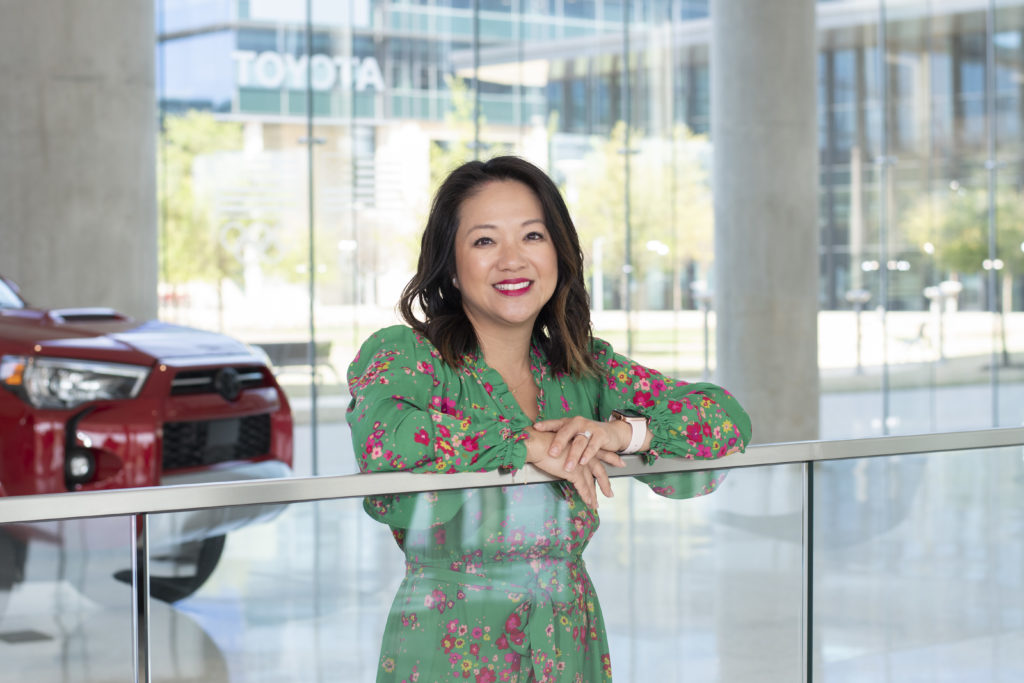
“As lawyers, we can often find ourselves at arm’s length, only sought for a specific question,” she said. “It took four years and a pandemic, but it was very fulfilling to be able to demonstrate and [be] seen as a valued business partner, beyond the technical legal advice.”
The Covid-19 pandemic certainly impacted employment counsel for companies more than just about any other branch of the legal profession.
Ly Ortiz said she worked 12- to 14-hour days between the middle of March through the end of May.
“It was a very intense time for all of us as we grappled with staying on top of federal, state and local laws and regulations, which changed at least weekly, if not daily, for a period of time in order to advise our clients on whether we could operate and under what circumstances and how to keep employees as safe as possible during the entire process,” she said.
“Everything from stay-at-home orders and exceptions to temperature and symptom checking to face coverings and travel restrictions and now vaccines,” she said. “All of it affects the workplace and as in-house lawyers. It’s not just what we can legally do but beyond legalities, what should we do? What is the right thing to do in light of a global pandemic?”
The pandemic, Ly Ortiz said, highlighted the importance of cross-functional teams – crisis management, project management, compliance and risk management and public relations – and not to work in a silo.
On the pro bono front, Ly Ortiz was the 2020 co-chair of the Dallas Bar Association’s Equal Access to Justice campaign, which benefits the Dallas Volunteer Attorney Program and Legal Aid of Northwest Texas.
“Let me not bury the lede: we raised over $1.3 million, the most the campaign had ever raised in its history, during the pandemic,” she said.
Ly Ortiz and the DBA team received contributions from more than 800 donors – up from 515 donors in 2019. Half of those giving money were either first time donors or had not contributed during the past five years. She sent out more than 1,000 emails in January 2020 seeking donations.
“Candidly, I hate asking for money, and this was the first – and hopefully only – time I’ll have to do it,” she said. “It was so, so much work. I’m so glad we did it. That’s more people getting access to the legal help they need – and can be the difference between getting veteran benefits or staying in their home or getting a fresh start through expunction.”
Mentoring is clearly Ly Ortiz’s passion. She has mentored an average of four law students annually since she became a lawyer in 2006. She also has coached moot court since graduating from law school 15 years ago, which takes about two hours two to three times a week.
“The impact is felt when my students get that ‘aha’ moment during a coaching session, when they win advocacy awards, when they feel seen and feel like they belong in our profession, when they land their first job or share their pride at winning their first hearing,” she said. “The impact is felt when angst and fear and overwhelm turns into hope, clarity and confidence in the span of a phone call.”
Ly Ortiz said that many corporate lawyers wrongly think they have nothing to contribute or don’t have the time to contribute for pro bono or public service.
To those lawyers, she has this advice:
“Stop thinking big – stop thinking ‘go big or go home’ or that it’s all or nothing,” she said. “Pro bono and public service or community work doesn’t have to be taking an entire matter, serving on a board for a year or hours away from your family that you may already not see often due to work. It’s not some kind of zero-sum game.
“Instead, think small – as in small actions matter,” she said. “Mentor someone for 30-minutes. Guest judge a moot court team for an hour. Sort canned food once a month. Or if you don’t have the time, donate some funds or buy coats for the children’s shelter. These small actions matter, and they add up.”
Haynes and Boone counsel Michael Gaston-Bell, who specializes in employment law, said Ly Ortiz’s “thirst for knowledge” makes her a great lawyer.
“Mey, more than anyone I know, seeks to enrich herself and others with knowledge about the field of law in which we specialize,” he said. “Mey is constantly seeking to grow her understanding of the nuances in the field of employment law, and when she learns new things, she is quick to try to provide value to others by posting and writing great articles.”
Gaston-Bell said Ly Ortiz is “the best kind of leader – someone who leads by example and without imposition.”
“Mey is one of the few who genuinely seem to give more than they take from this profession and the people she encounters,” he said. “The number of people whose lives and careers Mey impacts during her time practicing will be countless.”
